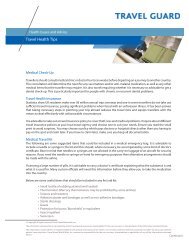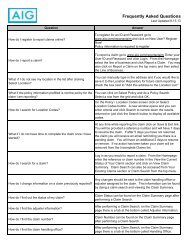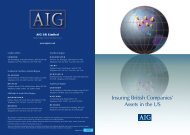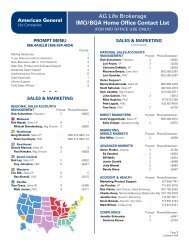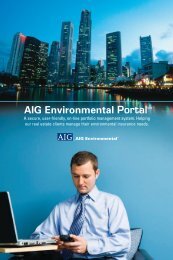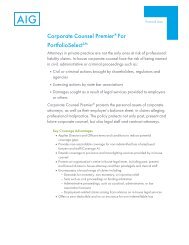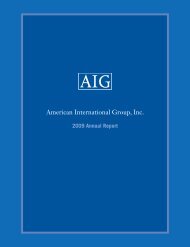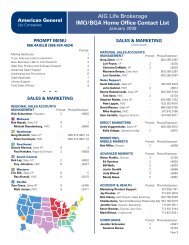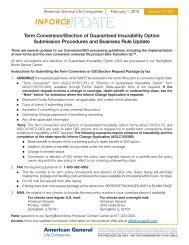Bring on tomorrow - AIG.com
Bring on tomorrow - AIG.com
Bring on tomorrow - AIG.com
You also want an ePaper? Increase the reach of your titles
YUMPU automatically turns print PDFs into web optimized ePapers that Google loves.
ITEM 1A / RISK FACTORS.....................................................................................................................................................................................Competiti<strong>on</strong> for employees in our industry is intense, and we may not be able to attract and retain the highlyskilled people we need to support our business. Our success depends, in large part, <strong>on</strong> our ability to attract andretain key people. Due to the intense <strong>com</strong>petiti<strong>on</strong> in our industry for key employees with dem<strong>on</strong>strated ability, wemay be unable to hire or retain such employees. Losing any of our key people also could have a material adverseeffect <strong>on</strong> our operati<strong>on</strong>s given their skills, knowledge of our business, years of industry experience and the potentialdifficulty of promptly finding qualified replacement employees. Our results of operati<strong>on</strong>s and financial c<strong>on</strong>diti<strong>on</strong> couldbe materially adversely affected if we are unsuccessful in attracting and retaining key employees.Mr. Benmosche may be unable to c<strong>on</strong>tinue to provide services to <strong>AIG</strong> due to his health. Robert Benmosche,our President and Chief Executive Officer, was diagnosed with cancer and has been undergoing treatment for hisdisease. He c<strong>on</strong>tinues to fulfill all of his resp<strong>on</strong>sibilities and has stated his desire to c<strong>on</strong>tinue in such roles bey<strong>on</strong>d2013. However, his c<strong>on</strong>diti<strong>on</strong> may change and prevent him from c<strong>on</strong>tinuing to perform these roles.Employee error and misc<strong>on</strong>duct may be difficult to detect and prevent and may result in significant losses.There have been a number of cases involving fraud or other misc<strong>on</strong>duct by employees in the financial servicesindustry in recent years and we run the risk that employee misc<strong>on</strong>duct could occur. Instances of fraud, illegal acts,errors, failure to document transacti<strong>on</strong>s properly or to obtain proper internal authorizati<strong>on</strong>, or failure to <strong>com</strong>ply withregulatory requirements or our internal policies may result in losses. It is not always possible to deter or preventemployee misc<strong>on</strong>duct, and the c<strong>on</strong>trols that we have in place to prevent and detect this activity may not be effectivein all cases.REGULATION..............................................................................................................................................................................................Our businesses are heavily regulated and changes in regulati<strong>on</strong> may affect our operati<strong>on</strong>s, increase ourinsurance subsidiary capital requirements or reduce our profitability. Our operati<strong>on</strong>s generally, and ourinsurance subsidiaries, in particular, are subject to extensive supervisi<strong>on</strong> and regulati<strong>on</strong> by nati<strong>on</strong>al authorities and bythe various jurisdicti<strong>on</strong>s in which we do business. Supervisi<strong>on</strong> and regulati<strong>on</strong> relate to numerous aspects of ourbusiness and financial c<strong>on</strong>diti<strong>on</strong>. The primary purpose of insurance regulati<strong>on</strong> is the protecti<strong>on</strong> of our insurancec<strong>on</strong>tract holders, and not our investors. The extent of domestic regulati<strong>on</strong> varies, but generally is governed by statestatutes. These statutes delegate regulatory, supervisory and administrative authority to state insurance departments.We strive to maintain all required licenses and approvals. However, our businesses may not fully <strong>com</strong>ply with thewide variety of applicable laws and regulati<strong>on</strong>s. The relevant authority’s interpretati<strong>on</strong> of the laws and regulati<strong>on</strong>salso may change from time to time. Regulatory authorities have relatively broad discreti<strong>on</strong> to grant, renew or revokelicenses and approvals. If we do not have the required licenses and approvals or do not <strong>com</strong>ply with applicableregulatory requirements, these authorities could preclude or temporarily suspend us from carrying <strong>on</strong> some or all ofour activities or impose substantial fines. Further, insurance regulatory authorities have relatively broad discreti<strong>on</strong> toissue orders of supervisi<strong>on</strong>, which permit them to supervise the business and operati<strong>on</strong>s of an insurance <strong>com</strong>pany.In the U.S., the risk based capital (RBC) formula is designed to measure the adequacy of an insurer’s statutorysurplus in relati<strong>on</strong> to the risks inherent in its business. Virtually every state has adopted, in substantial part, the RBCModel Law promulgated by the Nati<strong>on</strong>al Associati<strong>on</strong> of Insurance Commissi<strong>on</strong>ers (NAIC), which specifies theregulatory acti<strong>on</strong>s the insurance regulator may take if an insurer’s RBC calculati<strong>on</strong>s fall below specific thresholds.Those acti<strong>on</strong>s range from requiring an insurer to submit a plan describing how it would regain a specified RBC ratio,to a mandatory regulatory takeover of the <strong>com</strong>pany.The degree of regulati<strong>on</strong> and supervisi<strong>on</strong> in foreign jurisdicti<strong>on</strong>s varies. Generally, <strong>AIG</strong> Parent, as well as itssubsidiaries operating in such jurisdicti<strong>on</strong>s, must satisfy local regulatory requirements. Licenses issued by foreignauthorities to our subsidiaries are subject to modificati<strong>on</strong> and revocati<strong>on</strong>. Thus, our insurance subsidiaries could beprevented from c<strong>on</strong>ducting future business in certain of the jurisdicti<strong>on</strong>s where they currently operate. Adverseacti<strong>on</strong>s from any single country could adversely affect our results of operati<strong>on</strong>s, liquidity and financial c<strong>on</strong>diti<strong>on</strong>,depending <strong>on</strong> the magnitude of the event and our financial exposure at that time in that country.Our status as a savings and loan holding <strong>com</strong>pany and the enactment of the Dodd-Frank Wall Street Reformand C<strong>on</strong>sumer Protecti<strong>on</strong> Act (Dodd-Frank) will subject us to substantial additi<strong>on</strong>al federal regulati<strong>on</strong>, eitheror both of which may materially and adversely affect our businesses, results of operati<strong>on</strong>s and cash flows.On July 21, 2010, Dodd-Frank, which effects <strong>com</strong>prehensive changes to the regulati<strong>on</strong> of financial services in theUnited States, was signed into law. Dodd-Frank directs existing and newly created government agencies and bodies..................................................................................................................................................................................................................................<strong>AIG</strong> 2012 Form 10-K 39



